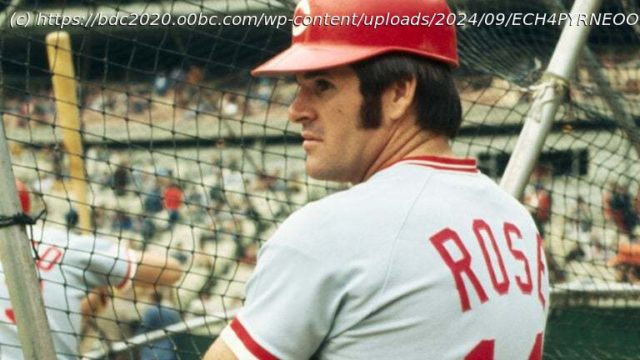A spokesperson for Clark County in Nevada said that Rose died Monday, adding the cause and manner of death had not yet been determined.
Pete Rose, baseball’s career hits leader and fallen idol who undermined his historic achievements and Hall of Fame dreams by gambling on the game he loved and once embodied, has died. He was 83.
Stephanie Wheatley, a spokesperson for Clark County in Nevada, confirmed on behalf of the medical examiner that Rose died Monday. Wheatley said his cause and manner of death had not yet been determined.
For fans who came of age in the 1960s and ‘70s, no player was more exciting than the Cincinnati Reds’ No. 14, “Charlie Hustle,” the brash superstar with the shaggy hair, puggish nose and muscular forearms. At the dawn of artificial surfaces, divisional play and free agency, Rose was old school, a conscious throwback to baseball’s early days. Millions could never forget him crouched and scowling at the plate, running full speed to first even after drawing a walk, or sprinting for the next base and diving headfirst into the bag.
A 17-time All-Star, the switch-hitting Rose played on three World Series winners. He was the National League MVP in 1973 and World Series MVP two years later. He holds the major league record for games played (3,562) and plate appearances (15,890) and the NL record for the longest hitting streak (44). He was the leadoff man for one of baseball’s most formidable lineups with the Reds’ championship teams of 1975 and 1976, with teammates that included Hall of Famers Johnny Bench, Tony Perez and Joe Morgan.
But no milestone approached his 4,256 hits, breaking his hero Ty Cobb’s 4,191 and signifying his excellence no matter the notoriety which followed. It was a total so extraordinary that you could average 200 hits for 20 years and still come up short. Rose’s secret was consistency, and longevity. Over 24 seasons, all but six played entirely with the Reds, Rose had 200 hits or more 10 times, and more than 180 four other times. He batted .303 overall, even while switching from second base to outfield to third to first, and he led the league in hits seven times.
“Every summer, three things are going to happen,” Rose liked to say, “the grass is going to get green, the weather is going to get hot, and Pete Rose is going to get 200 hits and bat .300.”
Rose was Rookie of the Year in 1963, but he started off 0 for 12 with three walks and a hit by pitch before getting his first major league hit, an eighth-inning triple off Pittsburgh’s Bob Friend. It came in Cincinnati on April 13, 1963, the day before Rose’s 22nd birthday. He reached 1,000 in 1968, 2,000 just five years later and 3,000 just five years after that.
He moved into second place, ahead of Hank Aaron, with hit No. 3,772, in 1982. No. 4,000 was off the Phillies’ Jerry Koosman in 1984, exactly 21 years to the day after his first hit. He caught up with Cobb on Sept. 8, 1985, and surpassed him three days later, in Cincinnati, with Rose’s mother and teenage son, Pete Jr., among those in attendance.
Rose was 44 and the team’s player-manager. Batting left-handed against the San Diego Padres’ Eric Show in the first inning, he smacked a 2-1 slider into left field, a clean single. The crowd of 47,000-plus stood and yelled. The game was halted to celebrate. Rose was given the ball and the first base bag, then wept openly on the shoulder of first base coach and former teammate, Tommy Helms. He told Pete Jr., who would later play briefly for the Reds: “I love you, and I hope you pass me.” He thought of his late father, a star athlete himself who had pushed him to play sports since childhood. And he thought of Cobb, the dead-ball era slasher whom Rose so emulated that he named another son Tyler.
Baseball Commissioner Peter Ueberroth, watching from New York, declared that Rose had “reserved a prominent spot in Cooperstown.” After the game, a 2-0 win for the Reds in which Rose scored both runs, he received a phone call from President Ronald Reagan.
“Your reputation and legacy are secure,” Reagan told him. “It will be a long time before anyone is standing in the spot where you’re standing now.”
Four years later, he was gone.
On March 20, 1989, Ueberroth (who would soon be succeeded by A. Bartlett Giamatti) announced that his office was conducting a “full inquiry into serious allegations” about Rose. Reports emerged that he had been relying on a network of bookies and friends and others in the gambling world to place bets on baseball games, including some with the Reds. Rose denied any wrongdoing, but the investigation found that the “accumulated testimony of witnesses, together with the documentary evidence and telephone records reveal extensive betting activity by Pete Rose in connection with professional baseball and, in particular, Cincinnati Reds games, during the 1985, 1986, and 1987 baseball seasons.”
Betting on baseball had been a primal sin since 1920, when several members of the Chicago White Sox were expelled for throwing the 1919 World Series — to the Cincinnati Reds.






